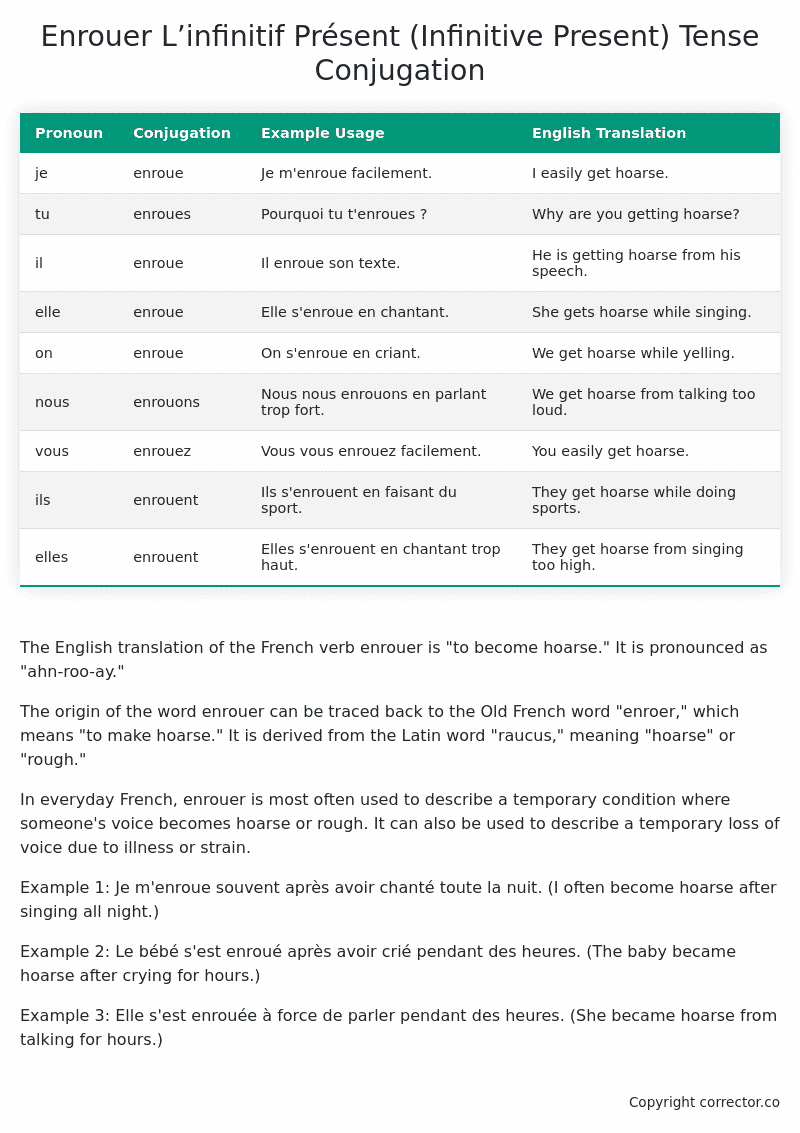L’infinitif Présent (Infinitive Present) Tense Conjugation of the French Verb enrouer
Introduction to the verb enrouer
The English translation of the French verb enrouer is “to become hoarse.” It is pronounced as “ahn-roo-ay.”
The origin of the word enrouer can be traced back to the Old French word “enroer,” which means “to make hoarse.” It is derived from the Latin word “raucus,” meaning “hoarse” or “rough.”
In everyday French, enrouer is most often used to describe a temporary condition where someone’s voice becomes hoarse or rough. It can also be used to describe a temporary loss of voice due to illness or strain.
Example 1: Je m’enroue souvent après avoir chanté toute la nuit. (I often become hoarse after singing all night.)
Example 2: Le bébé s’est enroué après avoir crié pendant des heures. (The baby became hoarse after crying for hours.)
Example 3: Elle s’est enrouée à force de parler pendant des heures. (She became hoarse from talking for hours.)
Table of the L’infinitif Présent (Infinitive Present) Tense Conjugation of enrouer
| Pronoun | Conjugation | Example Usage | English Translation |
|---|---|---|---|
| je | enroue | Je m’enroue facilement. | I easily get hoarse. |
| tu | enroues | Pourquoi tu t’enroues ? | Why are you getting hoarse? |
| il | enroue | Il enroue son texte. | He is getting hoarse from his speech. |
| elle | enroue | Elle s’enroue en chantant. | She gets hoarse while singing. |
| on | enroue | On s’enroue en criant. | We get hoarse while yelling. |
| nous | enrouons | Nous nous enrouons en parlant trop fort. | We get hoarse from talking too loud. |
| vous | enrouez | Vous vous enrouez facilement. | You easily get hoarse. |
| ils | enrouent | Ils s’enrouent en faisant du sport. | They get hoarse while doing sports. |
| elles | enrouent | Elles s’enrouent en chantant trop haut. | They get hoarse from singing too high. |
Other Conjugations for Enrouer.
Le Present (Present Tense) Conjugation of the French Verb enrouer
Imparfait (Imperfect) Tense Conjugation of the French Verb enrouer
Passé Simple (Simple Past) Tense Conjugation of the French Verb enrouer
Passé Composé (Present Perfect) Tense Conjugation of the French Verb enrouer
Futur Simple (Simple Future) Tense Conjugation of the French Verb enrouer
Futur Proche (Near Future) Tense Conjugation of the French Verb enrouer
Plus-que-parfait (Pluperfect) Tense Conjugation of the French Verb enrouer
Passé Antérieur (Past Anterior) Tense Conjugation of the French Verb enrouer
Futur Antérieur (Future Anterior) Tense Conjugation of the French Verb enrouer
Subjonctif Présent (Subjunctive Present) Tense Conjugation of the French Verb enrouer
Subjonctif Passé (Subjunctive Past) Tense Conjugation of the French Verb enrouer
Subjonctif Imparfait (Subjunctive Imperfect) Tense Conjugation of the French Verb enrouer
Subjonctif Plus-que-parfait (Subjunctive Pluperfect) Tense Conjugation of the French Verb enrouer
Conditionnel Présent (Conditional Present) Tense Conjugation of the French Verb enrouer
Conditionnel Passé (Conditional Past) Tense Conjugation of the French Verb enrouer
L’impératif Présent (Imperative Present) Tense Conjugation of the French Verb enrouer
L’infinitif Présent (Infinitive Present) Tense Conjugation of the French Verb enrouer (this article)
Struggling with French verbs or the language in general? Why not use our free French Grammar Checker – no registration required!
Get a FREE Download Study Sheet of this Conjugation 🔥
Simply right click the image below, click “save image” and get your free reference for the enrouer L’infinitif Présent tense conjugation!

Enrouer – About the French L’infinitif Présent (Infinitive Present) Tense
Forming the Infinitive Present
Common Everyday Usage Patterns
As a Verb’s Dictionary Form
After Modal Verbs
As an Imperative
In Infinitive Clauses
Interactions with Other Tenses
Present Tense
Future Tense
Conditional Tense
Passé Composé
Imperfect Tense
Subjunctive and Conditional Moods
Summary
Want More?
I hope you enjoyed this article on the verb enrouer. Still in a learning mood? Check out another TOTALLY random French verb conjugation!


